
The Wiener Hofmusikkapelle / Vienna Court Music Ensemble is one of the oldest institutions of its kind worldwide. Already under the reign of Friedrich III. (1415–1493) a church choir was established. On July 7, 1498, his successor, Maximilian I. (1459–1519), ordered the appointment of a conductor, two bass singers and six choir boys. This date is officially regarded as the ensemble’s hour of birth.
Under the reign of Ferdinand I. (1503–1564) the majority of the ensemble was recruited from a region belonging to Belgium today, while under Ferdinand II. (1578–1637) Italian musicians were predominant. The Vienna Court Music Ensemble experienced its zenith under the rule of the composing emperors Ferdinand III. (1608–1657), Leopold I. (1640–1705), Joseph I. (1678–1711) and Karl VI. (1685–1740). Maria Theresia (1717–1780) and Joseph II. (1741–1790) reduced the ensemble’s performances to sacral music. Beethoven’s mentor Antonio Salieri was the last court conductor of Italian style. In the 19th century, the ensemble’s most famous members were Franz Schubert, who sang in the boys choir, Anton Bruckner, who was organist at court between 1878 and 1892, and the conductor Hans Richter, who was also musical director of the ensemble between 1893 and 1900. After the end of the First World War, the Court Music Ensemble was incorporated into the federal administration and is currently part of the Federal Ministry for Housing, Arts, Culture, Media and Sport.
Many outstanding personalities contributed to the ensemble’s growing popularity in the last century such as Franz Schalk, Clemens Krauss, Josef Krips, Ferdinand Grossmann, Hans Gillesberger, Helmuth Froschauer, Uwe Christian Harrer, Martin Haselböck and Erwin Ortner. Riccardo Muti was appointed as an honorary member of the Vienna Court Music Ensemble as a result of their many years of collaboration.
The Vienna Court Music Ensemble consists of the Vienna Boys’ Choir, members of the Vienna State Opera orchestra and men’s choir, the “Choralschola” of the Vienna Imperial Court Chapel as well as internationally recognised conductors and organists. They perform the service in the Vienna Imperial Court Chapel every Sunday at 9:15 am from mid-September to the end of June. The famous masses by Haydn, Salieri, Mozart, Beethoven and Schubert are at the centre of the repertoire, which ranges from the Renaissance to the present day. The Vienna Court Music Ensemble is under the overall artistic and administrative direction of Jürgen Partaj, who was appointed director of the institution in 2019.